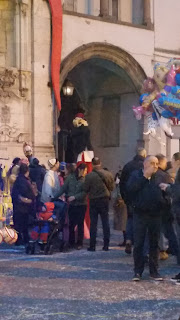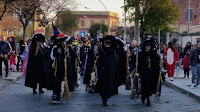It's early March now. Already I can walk to work in a summer coat.The almond and peach trees have been in blossom for some time now. On the streets of Naples you can see flower sellers selling the bright yellow branches of Mimosa blossom. Winter seems to be well and truly over!


I'm on my way home from work. In the narrow cobbled streets of Capua it's very quiet. There are the smells of washing powder and ragu sauce. People are inside, about to settle down for the evening. The streets are almost deserted. On the cobbles below my feet are the brightly coloured strands of coriandoli or confetti. Evidence of a different scene. Evidence of Carnival.

This is the festival that many Roman Catholic countries celebrate in the days before Lent. The origin of the word is uncertain but it probably comes from Medieval Latin Carnem Levare or Carnelevarium, which means to take away or remove meat.Traditionally the 40 days of Lent, leading up to the celebration of Easter, was a time when people fasted or abstained from the eating of meat. The origins of the festival itself are equally unclear but probably come from a primitive festival marking the beginning of spring and the rebirth of nature.
 In Italy carnival seems to be descended directly from the Saturnalia. This was an ancient Roman festival celebrated from the 17th to the 23rd of December, dedicated to the Roman god, Saturn. It was celebrated with great banquets, sacrifices and an overturning of the social order.
In Italy carnival seems to be descended directly from the Saturnalia. This was an ancient Roman festival celebrated from the 17th to the 23rd of December, dedicated to the Roman god, Saturn. It was celebrated with great banquets, sacrifices and an overturning of the social order. A slave was elected as Princeps or governor. He was assigned all power and dressed in a funny mask and brightly coloured clothes, caricaturing the dress of the noble class. He was supposedly a personification of the gods Saturn and Pluto, in charge of all the souls of the underworld but also a protector of the crops and nature.
A slave was elected as Princeps or governor. He was assigned all power and dressed in a funny mask and brightly coloured clothes, caricaturing the dress of the noble class. He was supposedly a personification of the gods Saturn and Pluto, in charge of all the souls of the underworld but also a protector of the crops and nature.The Romans believed that these gods wandered the earth in winter and had to be placated with gifts and celebrations in order to persuade them to return to the the underworld and ensure the fertility of the new crops. The carnival parade seems to be a direct descendant of this practice.

The modern celebration of the carnival in Capua dates from 1886. It is orgaanised by the pro-Loco and city council. It lasts for four days; from Thursday until Shrove Tuesday. Children are given these days off school to allow them to join in the festivities.


It begins with an amazing procession of floats, marching bands,stilt walkers, masqued people in colourful period and Halloween costumes, smoke, balloons, dancers and the dramatic arrival of the king and queen of carnival in a royal horse-drawn
carriage. You've seen nothing like it!

On one float you see a fantastic model of smoking Mount Vesuvius. You look again and you see a woman cooking and selling pizza on the same float. Yes! You'll never see anything like this again!

The opening ceremony takes place in the square in the evening and involves the mayor of the city publicly handing over the keys of the city to the king of the carnival. It begins a succession of shows,masked balls and performances by school groups that lasts for four days. It comes to a dramatic conclusion with the funeral procession of the king of the carnival with the burning of the bier and a dramatic firework show.

The king of Carnival has been put to rest. We can all get down to the serious business of Lent.
As I walk home it is King Carnival's speech to the people of Capua that I remember. It is a long satire or 'Cicuzze'- that takes its name from the sharp bebbles that can wound.
In the Judges Square, in front of many of the town's inhabitants, he boldly gave forth on the problems that it faces in the present day,highlighting the weaknesses of the recent administration in governing the town. Castigat ridendo mores in a very clever and amusing manner.

He recounts the attractions of the town: its intriguing history, impressive architecture and its rich culture heritage. 'The stones still speak' he concluded.
As my modern court shoes slip between the town's old cobbles yet again, I am forced to agree.
Modern fashion must give way to ancient traditions. I must buy another pair of shoes.




